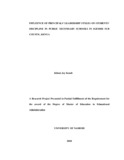| dc.contributor.author | Kilemi, Joy K | |
| dc.date.accessioned | 2019-01-14T06:57:55Z | |
| dc.date.available | 2019-01-14T06:57:55Z | |
| dc.date.issued | 2018 | |
| dc.identifier.uri | http://hdl.handle.net/11295/104559 | |
| dc.description.abstract | The purpose of this study was to investigate the influence of principals’ leadership styles on students’ discipline in public secondary schools in Igembe Sub-County, Kenya. The objectives were to establish the influence of democratic leadership style, transactional leadership, transformational leadership style and authoritarian leadership style on students’ discipline in public secondary schools in Igembe Sub-County, Kenya. The research applied descriptive research design employing simple sampling technique. The study sampled 40 teachers, 18 principals and 220 students. Questionnaires were used for data collection .Reliability was determined through test-retest method and calculated using Pearson’s correlation coefficient resulting in coefficient value of 0.7 for teachers’ questionnaire and 0.8 for principals’ questionnaire. Validity was ensured through discussion with the experts and using questions framed in an unambiguous way. Data was analysed using descriptive statistics assisted by SPSS and presented in tables. The findings showed the existence of a positive relationship between the principal’s leadership style and students’ discipline. Democratic style of leadership is to some extent practiced where most principals made a chose on when and how to involve students and members of staff in decision making. The use of democratic leadership had a positive impact on discipline and thus it should be fully embraced. The study found out that the principals used transactional leadership styles in the schools where punishments and rewards as consequences for behaviour. This style was found to result to influence the discipline of students positively especially where the students were expected to adhere to school rules and regulations. Aspects of transformational leadership style such as charisma, idealized influence, inspirational motivation and individual consideration were being practiced, and these had a positive bearing on the discipline of the students, especially the application of guidance and counseling. The researcher recommends that: County Directors of Education should organize workshops to provide in-service training on head teachers on the appropriate leadership styles to employ to curb indiscipline. Teacher training institutions and management training institutions to include and put emphasis on leadership courses and their practicability to equip them with skills of effective managers. The researcher suggests a further study to be done on: the influence of leadership styles on the teachers’ job satisfaction; the influence of leadership styles on the school culture and climate; home-based factors that may influence students’ discipline other than principal’s leadership styles. | en_US |
| dc.language.iso | en | en_US |
| dc.publisher | university of nairobi | en_US |
| dc.rights | Attribution-NonCommercial-NoDerivs 3.0 United States | * |
| dc.rights.uri | http://creativecommons.org/licenses/by-nc-nd/3.0/us/ | * |
| dc.subject | Influence of Principals’ Leadership Styles | en_US |
| dc.title | Influence of Principals’ Leadership Styles on Students’ Discipline in Public Secondary Schools in Igembe Sub County, Kenya | en_US |
| dc.type | Thesis | en_US |



